In the fall of 2017, Eric Anderies and Jessica Anderies were admitted to the MEDEX Northwest physician assistant program. This is a wonderful thing in itself, of course. But it is also a wonderfully rare thing, given that Eric and Jessica are a married couple.
Prior to their joining MEDEX Spokane Class 21, this husband and wife team took a few post-baccalaureate classes together at the local community college to beef up their prerequisites before applying to MEDEX. “We were classmates then, we are classmates now, and we’ll probably be classmates later on down the road,” says Eric.
And as is required for admission to MEDEX, both Eric and Jessica brought prior medical experience with them. Jessica had worked for 4 years as a nurse. Eric had started as a physical therapy tech before becoming an emergency medical tech. But both found these career paths to have inherent limitations.
“I wanted to further my capability of helping patients,” Jessica explains. “I was able to do a lot to help my patients as a nurse, but I always wanted to do more. Instead of being a person that was managing the treatment plan, I wanted to be a part of developing the treatment plan and being able to make the changes for my patients. As a nurse, I felt like I was unable to make the changes that I wanted. As a PA, I feel like I will have that opportunity.”
In his job as a PT tech, Eric felt very limited in his capabilities. “I had my undergrad in kinesiology, so I knew that I really liked the human body, the mechanics. I liked the physiology of it. But when I started down that road, I realized I was very limited in what I could do. I knew there was more.”
Eric used his next job in emergency medicine as a stepping stone to entering the PA profession. He fully credits his wife, Jessica, for pointing him in that direction.
“She suggested I look into becoming a physician assistant,” Eric says. “I became an EMT, and then eventually applied for a job at an emergency room as an ER tech. That was a fantastic experience. I worked on a daily basis with PAs and got to see their utility within that setting. Employment within that setting really helped grow my desire to work in medicine, and especially become a PA.”
Now, both Eric and Jessica are deep into their clinical year at MEDEX. Under the supervision of practiced preceptors, they are learning the essential day-to-day skills for becoming accomplished physician assistants.
Jessica Anderies recalls that her initial interest in medicine began on the farm where she grew up.

“I love animals,” she tells us. “If an animal got hurt, I’d have to try to raise it back to health then release it back into the wild.”
Jessica started to pursue medicine as a career in high school. “I always enjoyed the health classes,” she says. “This was the one class that I felt passionate about, that I actually looked forward to learning.”
Jessica had her goals set on the nursing program at Washington State University in Pullman, WA. Admission there required two years of undergraduate studies. “That was the first hurdle,” she says. At that point, she applied to the WSU nursing program, which comprised her next two years. “That was a journey on its own,” she adds. “It was actually a very difficult program to get into and to finish.”
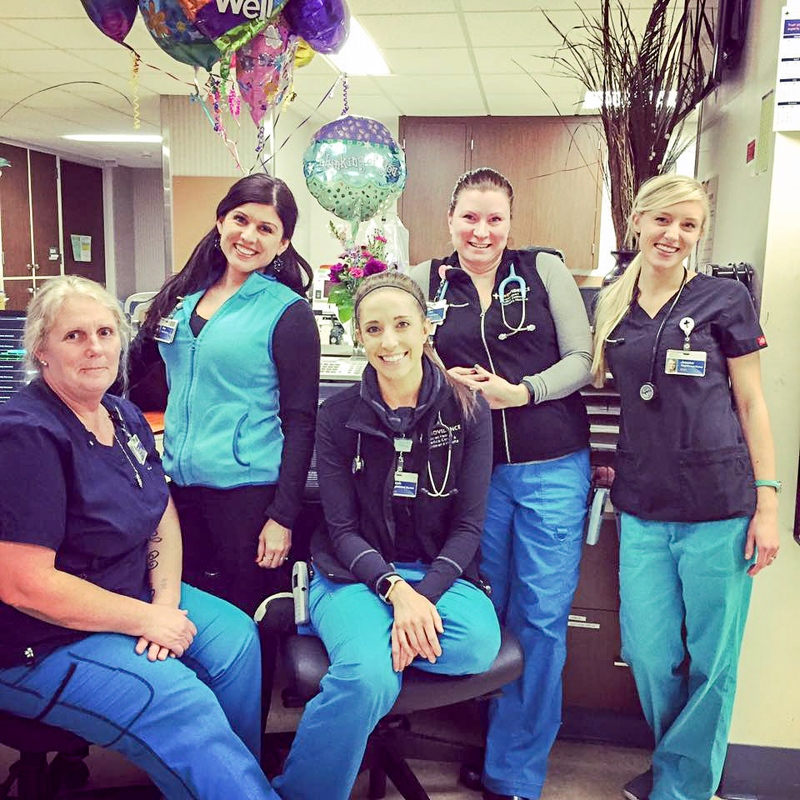
She started her new career as a nurse and worked at two hospitals. “It was a lot of fun and a huge learning experience. A great learning opportunity.” On the job, Jessica met a coworker who would eventually join the Spokane MEDEX program, and she became a mentor. “I just admired her so much and pretty much wanted to take the same steps she did.”
At that point in time, though, Jessica didn’t actually imagine she’d be the one going back to school. “Originally, it was him,” Jessica says referring to her husband. “We wanted him to apply.”
Eventually though, Eric explains, they both took on the application process.
“We were going over the prerequisites when Jessica noticed that she had most of the same classes as me. A lot of her nursing prerequisites were the same as mine.” Jessica had been looking for advancement in her career as well when it occurred to her, “Hey, I can do this too.”.
The couple decided to apply together.
Eric and Jessica understood that the probability of both getting into the program was extremely low. The plan was if only one of them was admitted, then the other one would reapply in the following year. “We had our fingers crossed and said our prayers,” Eric says. “We knew that we were both going to do this career.”
The day came and the couple learned that both had been accepted into MEDEX Spokane Class 21. Eric describes that day as one of the top moments in his life, “right behind marrying her.”
“The timing worked out extremely well and benefited both,” he adds. “Having Jessica as my study partner in the program has been positive all across the board. There really hasn’t been any downsides whatsoever. I mean, we study together, we can go home, we can quiz each other, we support each other. And really, we know the struggle that each other’s going through during this time. It’s really nice having that camaraderie and our relationship pretty much built in so that we can succeed in our courses.”
Jessica echoes Eric’s enthusiasm.
“Going through the PA program with my husband has been really nice,” she says “At first, I didn’t know what to expect. It was such a large change in our life and I didn’t know how it would go. But it turned out fantastic. Honestly, it’s so much fun having a study partner constantly, and we help each other the whole time. It’s been really nice and I wouldn’t trade it for the world.”
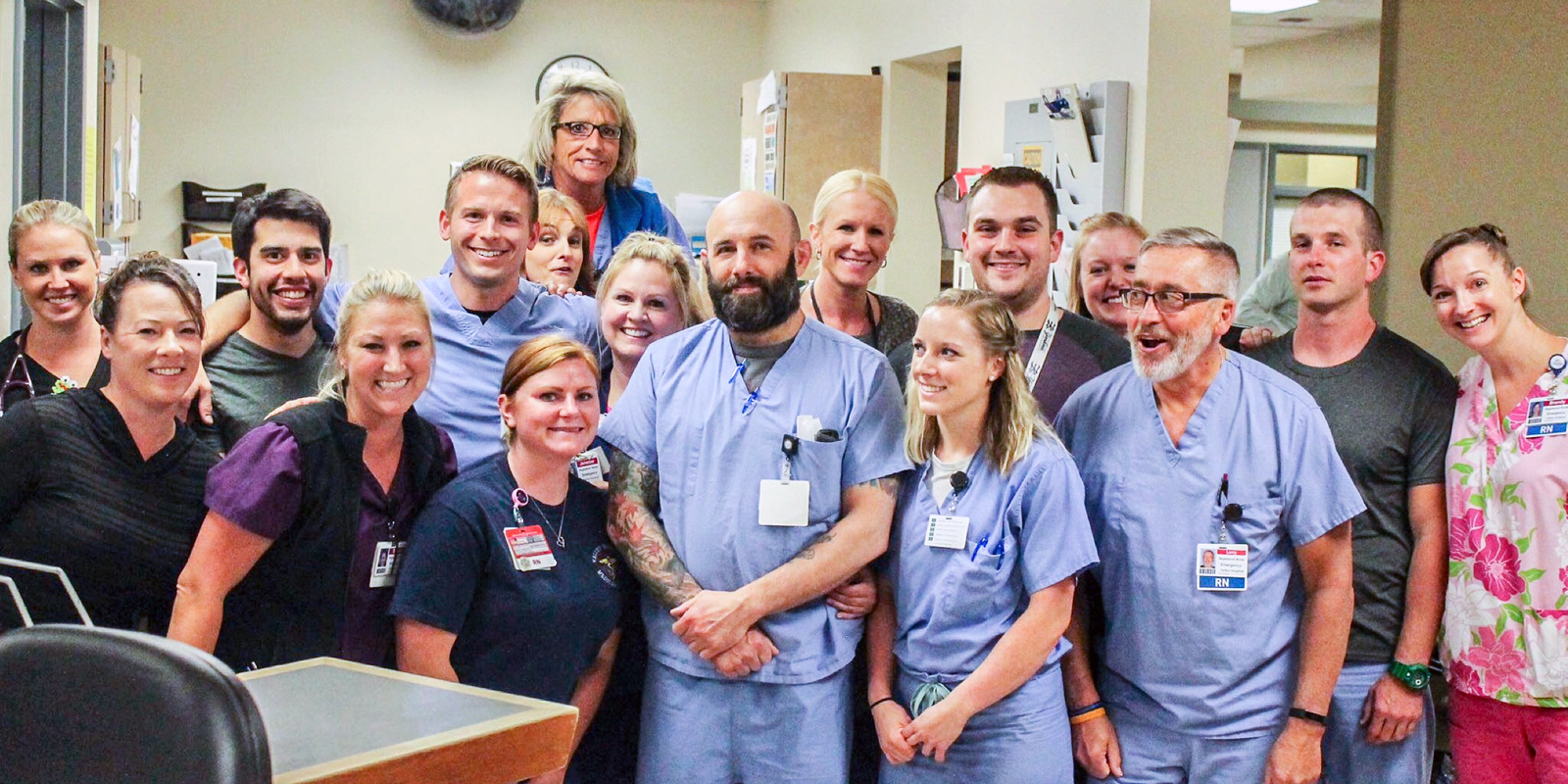
When we caught up with Jessica and Eric, they were in their clinical year fulfilling the 4-month-long family practice preceptorship. They had each been assigned to different clinics operated by Community Health Association of Spokane: Jessica to the CHAS Denny Murphy Clinic in downtown Spokane, and Eric to the CHAS Market Street Clinic some 8 miles to the north.
Eric’s preceptor at the Market Street Clinic was Daniel Troupe, PA-C. Working with Troupe on chronic care management proved to be quite a contrast to Eric’s prior medical experience in emergency services.
“I’ve never worked in primary care before, or in this kind of setting,” he explains, “so it was a little daunting. But within the first week and with the help of Daniel, I’ve started to understand the process and grown to know these patients, seeing them on a weekly basis, managing their care and seeing the outcomes on a longer spectrum, versus just right there in the moment. It’s been eye-opening for me.”
An urban clinic, CHAS Market Street Clinic addresses the needs of underserved people—those on welfare or Medicare and Medicaid. Eric describes the patient care there as “fantastic.”
“You get to see how much your efforts affect their care and how much they appreciate it.” This is different from the more hectic work environment that Eric was used to as an EMT. “There, we don’t really get to see the fruits of our labor with a patient.”
Like its sister clinic, the CHAS Denny Murphy Clinic serves the urban poor. “We’re in the downtown Spokane clinic,” says Jessica, “so we do see a lot of our transient population. I’ve had the opportunity to see children, adults and the elderly. I really like the feel of the clinic.”
Jessica is quick to praise her preceptor there, Bill Bomberger, PA-C, who is also a MEDEX graduate from 2003.
“Bill has been absolutely wonderful to work with,” Jessica says. “He’s such a great guy and so smart. It’s a bit intimidating. Even if nothing’s going on, he’ll turn to me and start telling me about the history of CHAS or physician assistant history. He’s just an endless book of knowledge. It’s quite impressive.”
As part of their clinical year, all MEDEX students are placed in a similar 4-month primary care preceptorship. Rounding out the education are six 1-month rotations in specialty areas, including behavioral medicine, emergency medicine, general surgery, inpatient internal medicine, a rotation in a medically underserved setting, and an elective of the student’s choice. Graduation occurs in late August. After that, there is the PANCE national certification exam to pass before a graduate can practice as a physician assistant.
Considering their exposure during their clinical year and their individual professional histories, we wonder if Jessica and Eric have any idea of their future direction in medicine.
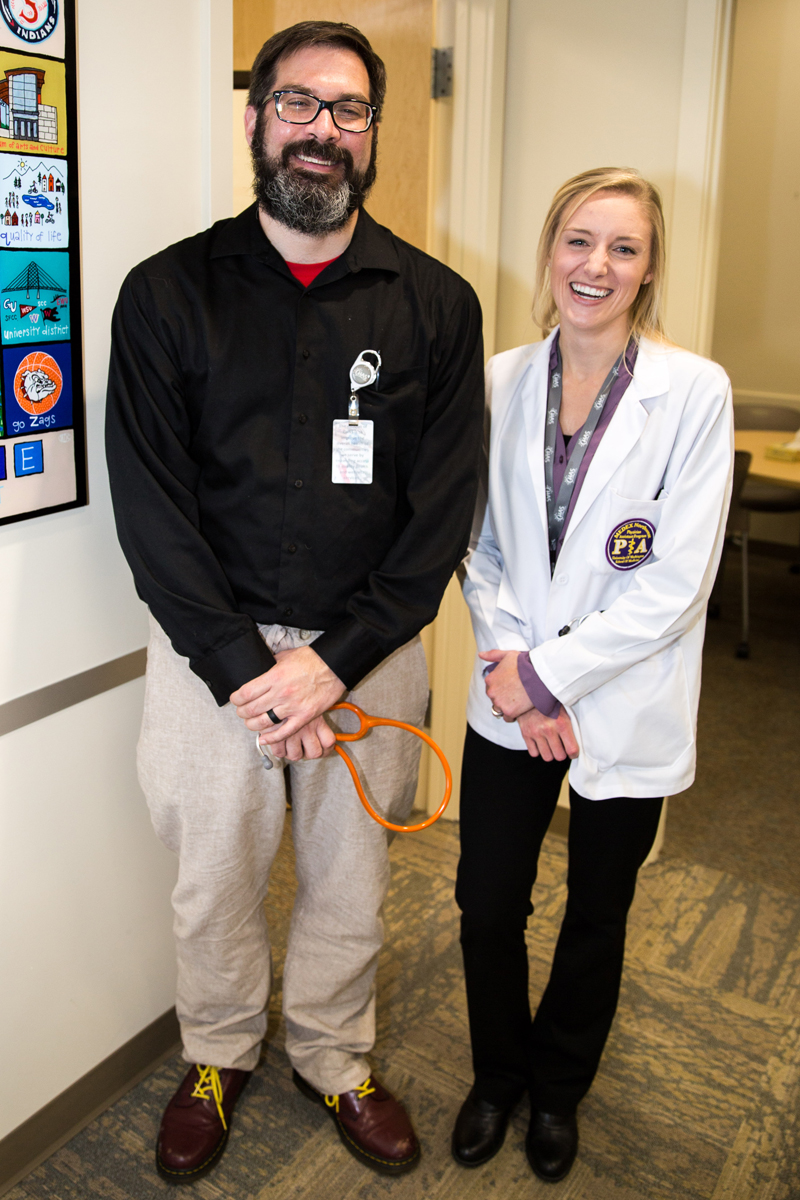
“Honestly, I’m not sure yet,” says Jessica. “I’m hoping to use this year to see where I fit in best, and where I excel. Pretty much all my nursing experience was in neuro, so I’m trying to keep an open mind.”
Like Jessica, Eric is unsure of career direction after graduation.
“I’m still new in this, it’s the beginning of my clinical year,” he says. “As I said, I’ve never been exposed to primary care before. Now I’m in this environment seeing all the wonderful aspects of it. I think that’s going to happen a lot throughout this year with each rotation. I’m going to find something I love and other things I’ll like more. I’ll probably decide the day after I pass the PANCE. But it’s nice knowing that these options are available. There’s not only one path that leads out of this. You have multiple opportunities to find what you truly love and go for it.”
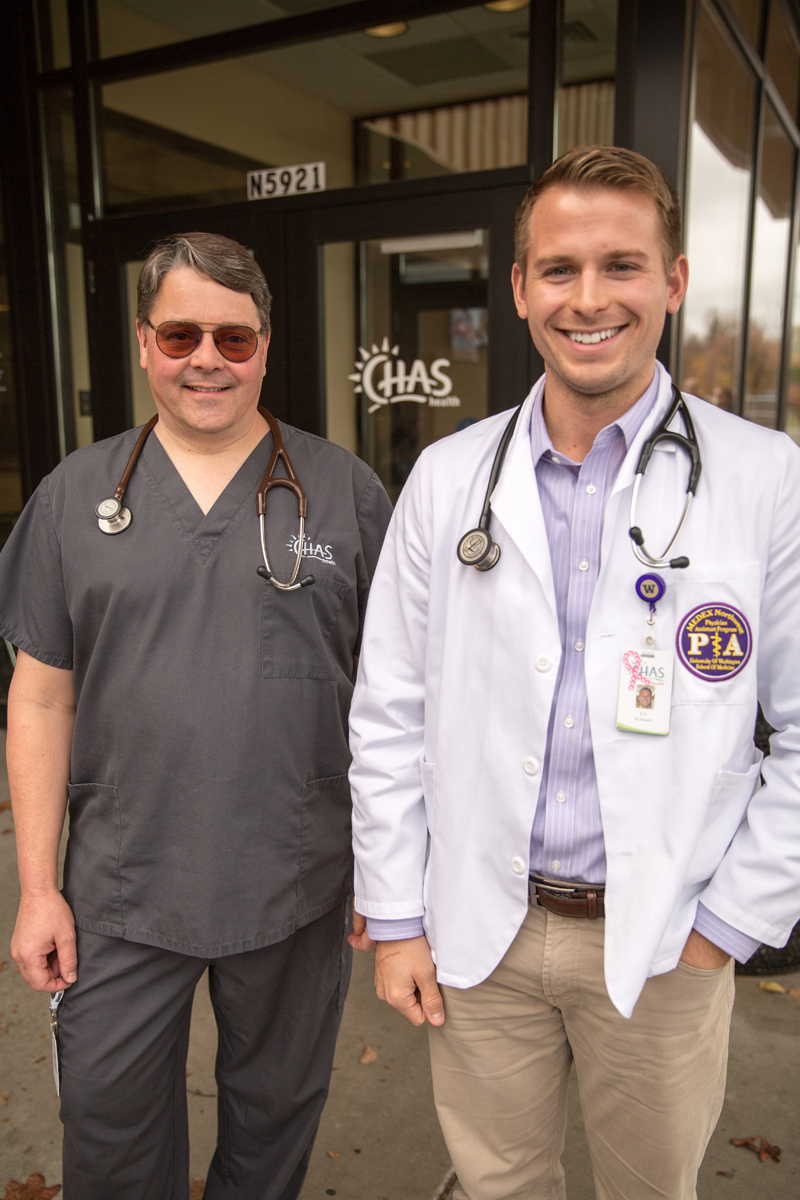
Though unsure of the professional paths each might take, Eric and Jessica have very clear notions of each other’s likely success.
“Jessica is very kind, very caring,” Eric says of his wife. “As far as her future endeavors, I think she will be extremely successful. She’s just got that spark that people need in this kind of work environment. With her peers, her patients and everyone that she works with, Jessica is going to do extremely well. I’m very proud of her.”
Jessica reflects this same admiration back at Eric. “I think he’s going to be a wonderful provider,” she says. “Eric is one of the smartest people I know, and he’s so passionate. I can see him being so good at whatever he chooses to do in the future.”
Both are equally generous in their appreciation of fellow MEDEX classmates. “Spokane Class 21 is by far the best,” Eric says. “We all get along extremely well. There’s a lot of friendships, a lot of connections.” He goes on to detail that they sometimes meet each other’s families, enjoy dinners together, and do fun things like board game nights.
“I think the connections we form now are going to really benefit us in the future,” he adds. “These are going to become our co-workers. They’re going to be the people that we rely on a daily basis, not only for support but their knowledge base and decision-making. The people we know now are going to have a major influence on us down the road.”
Jessica concurs. “The Spokane class has been a joy to work with. We’ve all developed great friendships. We often meet up and hang out on our days off. It’s a good group of people.”
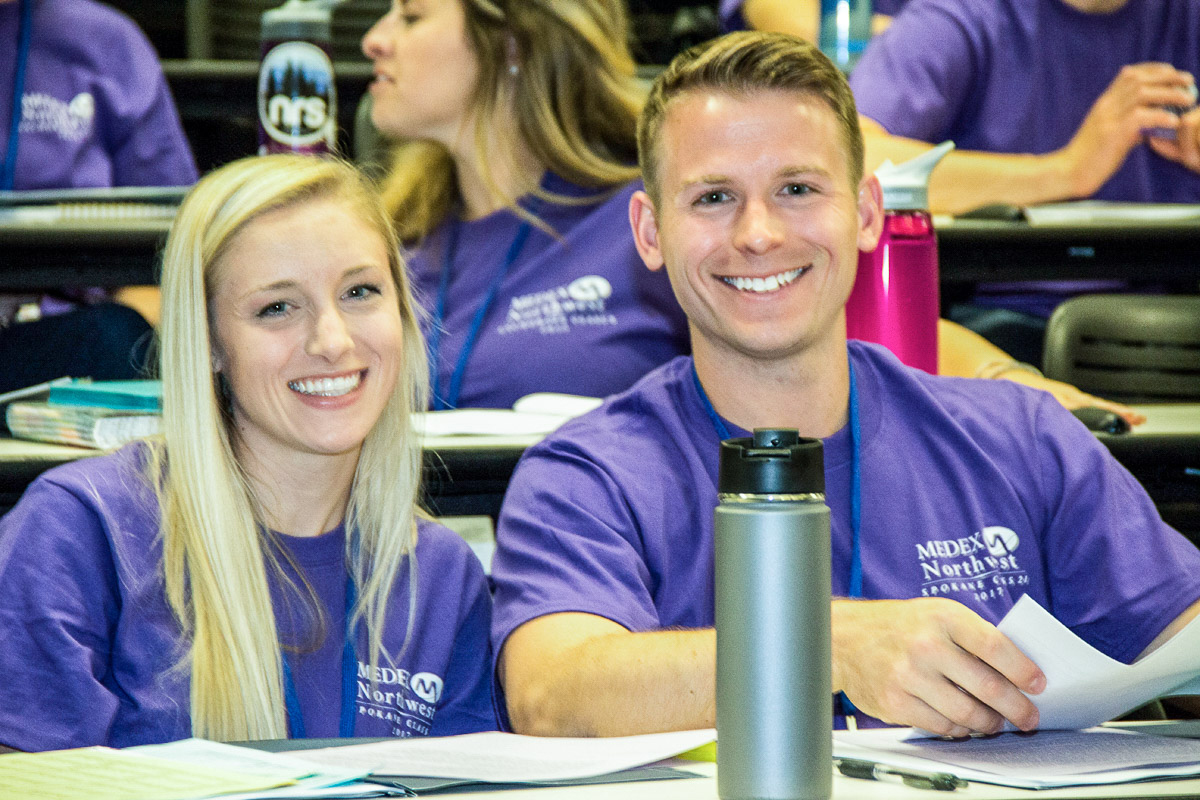
During the second year at MEDEX, classmates go their separate ways to fulfill their clinical requirements. “It’s been weird not being surrounded by them every single day,” says Jessica. “We all miss each other.”
Among all the students we’ve met across the years, few if any have referred to their initial year of classroom learning at MEDEX as something they’d like to repeat. Eric Anderies is the exception.
“Compared to undergrad and anything else, the MEDEX didactic year was an absolute blast,” he says. “I would love to do it again because it was very, very fun. I really enjoyed it. And the teachers were amazing. MEDEX has some of the best faculty I’ve ever met.”
“MEDEX was both of our first choices for many reasons,” adds Jessica. “First off, this program has been around for a long time. It’s well established. The community knows MEDEX. They know MEDEX makes fantastic PAs, and that’s what we were looking for. We were looking for a program that we knew was good and that we knew we were going to come out knowing what we needed to know to succeed as a PA’s.”

